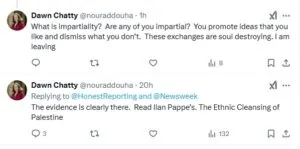RSS
Why Did Newsweek Choose to Spread Anti-Israel Propaganda and Lies?

Released Israeli hostage Yarden Bibas, who was seized during the deadly October 7, 2023 attack by Hamas, embraces loved ones in an unknown location, in this screengrab from a handout video obtained by Reuters on February 1, 2025. Photo: Israel Defense Forces/Handout via REUTERS
When media outlets interview academic experts, news consumers deserve an in-depth analysis.
But Newsweek’s attempt to do so last week, in a piece titled “Israel-Hamas war: What it Will Take to Rebuild Gaza,” was not only intellectually shallow, but also factually wrong and infected with personal animosity towards Israel.
Instead of asking serious questions and presenting various views, the magazine quoted biased experts whose level of analysis matched that of an average high school student on TikTok.
With subheaders that don’t require a Ph.D. — such as “Dr. Asher Kaufman: Rebuilding Gaza Will Take Years and Cost Billions, “Professor Best Dawn: Clearing the Rubble in Gaza Alone Will Take Years,” or “Professor Atalia Omer: There Is a Fear That Israel Has Rendered Gaza Uninhabitable” — the piece is an insult to common sense.
But perhaps more importantly, the magazine gave a platform to the historical revisionism of these so-called experts, who didn’t even bother doing their homework on the basic facts of the Israeli-Palestinian conflict.
Take Oxford University anthropologist Professor Dawn Chatty, for example, who falsely claims in the article that Israel implemented military Plan Dalet in 1948 to “clear Palestine of Palestinians,” i.e. ethnic cleansing.
The deliberate misinterpretation of events in 1948 to delegitimize Israel and claim it was born in sin is not new. Historian Benny Morris has categorically debunked the claim that there was a Zionist “plan” to evict Palestinians during the War of Independence.
Doesn’t Newsweek employ editors who either know a thing or two about the region’s history or are prepared to do some rudimentary fact-checking?
When HonestReporting raised these questions on social media, Chatty replied by telling us to “Read Ilan Pappe,” a charlatan who admitted he didn’t care about the truth and whom Benny Morris called “at best… one of the world’s sloppiest historians; at worst, one of the most dishonest.”

Also in the Newsweek article, Chatty spread blatant disinformation by claiming that the Palestinians’ “right of return” is enshrined under international law.
She conveniently ignored the fact that United Nations General Assembly Resolution 194 of 1948 is not legally binding and that there’s nothing in international law guaranteeing a Palestinian right to destroy Israel as a Jewish state demographically.
None of the above is surprising if one takes a quick look at Professor Chatty’s X account (formerly Twitter), which is almost exclusively full of anti-Israeli propaganda, including a post calling to suspend the Jewish State from the United Nations.
She also reposted what bona fide antisemite Jake Shields — whom the ADL says “has a history of espousing a range of hateful tropes and narratives including antisemitism, anti-Zionism, the Great Replacement theory, anti-LGBTQ+ rhetoric and more” — had to say against Israel in a tweet about the USS Liberty incident:

But Newsweek editors don’t seem to do any background checks on their experts.
They certainly didn’t do any due diligence on Professor Atalia Omer, who shared posts about “Israel’s state violence” and “apartheid.”
And Newsweek had no qualms about quoting her false claim that the International Court of Justice (ICJ) deemed Israel’s actions in Gaza as “plausibly genocidal.”
Sadly, it seems no editor was able to remind her that the former ICJ president said that “[The court] did not decide that the claim of genocide was plausible.”
And here’s Joan Donoghue, former President of the International Court of Justice, clarifying it on air
https://t.co/bFIORYUZQ5
— HonestReporting (@HonestReporting) January 28, 2025
So what Newsweek gave its readers was nothing more than a superficial mix of biased pseudo-academic analysis and lies.
In fact, the once-respected magazine used the former to mask the latter.
The author is a contributor to HonestReporting, a Jerusalem-based media watchdog with a focus on antisemitism and anti-Israel bias — where a version of this article first appeared.
The post Why Did Newsweek Choose to Spread Anti-Israel Propaganda and Lies? first appeared on Algemeiner.com.
RSS
After False Dawns, Gazans Hope Trump Will Force End to Two-Year-Old War

Palestinians walk past a residential building destroyed in previous Israeli strikes, after Hamas agreed to release hostages and accept some other terms in a US plan to end the war, in Nuseirat, central Gaza Strip October 4, 2025. Photo: REUTERS/Mahmoud Issa
Exhausted Palestinians in Gaza clung to hopes on Saturday that US President Donald Trump would keep up pressure on Israel to end a two-year-old war that has killed tens of thousands and displaced the entire population of more than two million.
Hamas’ declaration that it was ready to hand over hostages and accept some terms of Trump’s plan to end the conflict while calling for more talks on several key issues was greeted with relief in the enclave, where most homes are now in ruins.
“It’s happy news, it saves those who are still alive,” said 32-year-old Saoud Qarneyta, reacting to Hamas’ response and Trump’s intervention. “This is enough. Houses have been damaged, everything has been damaged, what is left? Nothing.”
GAZAN RESIDENT HOPES ‘WE WILL BE DONE WITH WARS’
Ismail Zayda, 40, a father of three, displaced from a suburb in northern Gaza City where Israel launched a full-scale ground operation last month, said: “We want President Trump to keep pushing for an end to the war, if this chance is lost, it means that Gaza City will be destroyed by Israel and we might not survive.
“Enough, two years of bombardment, death and starvation. Enough,” he told Reuters on a social media chat.
“God willing this will be the last war. We will hopefully be done with the wars,” said 59-year-old Ali Ahmad, speaking in one of the tented camps where most Palestinians now live.
“We urge all sides not to backtrack. Every day of delay costs lives in Gaza, it is not just time wasted, lives get wasted too,” said Tamer Al-Burai, a Gaza City businessman displaced with members of his family in central Gaza Strip.
After two previous ceasefires — one near the start of the war and another earlier this year — lasted only a few weeks, he said; “I am very optimistic this time, maybe Trump’s seeking to be remembered as a man of peace, will bring us real peace this time.”
RESIDENT WORRIES THAT NETANYAHU WILL ‘SABOTAGE’ DEAL
Some voiced hopes of returning to their homes, but the Israeli military issued a fresh warning to Gazans on Saturday to stay out of Gaza City, describing it as a “dangerous combat zone.”
Gazans have faced previous false dawns during the past two years, when Trump and others declared at several points during on-off negotiations between Hamas, Israel and Arab and US mediators that a deal was close, only for war to rage on.
“Will it happen? Can we trust Trump? Maybe we trust Trump, but will Netanyahu abide this time? He has always sabotaged everything and continued the war. I hope he ends it now,” said Aya, 31, who was displaced with her family to Deir Al-Balah in the central Gaza Strip.
She added: “Maybe there is a chance the war ends at October 7, two years after it began.”
RSS
Mass Rally in Rome on Fourth Day of Italy’s Pro-Palestinian Protests

A Pro-Palestinian demonstrator waves a Palestinian flag during a national protest for Gaza in Rome, Italy, October 4, 2025. Photo: REUTERS/Claudia Greco
Large crowds assembled in central Rome on Saturday for the fourth straight day of protests in Italy since Israel intercepted an international flotilla trying to deliver aid to Gaza, and detained its activists.
People holding banners and Palestinian flags, chanting “Free Palestine” and other slogans, filed past the Colosseum, taking part in a march that organizers hoped would attract at least 1 million people.
“I’m here with a lot of other friends because I think it is important for us all to mobilize individually,” Francesco Galtieri, a 65-year-old musician from Rome, said. “If we don’t all mobilize, then nothing will change.”
Since Israel started blocking the flotilla late on Wednesday, protests have sprung up across Europe and in other parts of the world, but in Italy they have been a daily occurrence, in multiple cities.
On Friday, unions called a general strike in support of the flotilla, with demonstrations across the country that attracted more than 2 million, according to organizers. The interior ministry estimated attendance at around 400,000.
Italy’s right-wing government has been critical of the protests, with Prime Minister Giorgia Meloni suggesting that people would skip work for Gaza just as an excuse for a longer weekend break.
On Saturday, Meloni blamed protesters for insulting graffiti that appeared on a statue of the late Pope John Paul II outside Rome’s main train station, where Pro-Palestinian groups have been holding a protest picket.
“They say they are taking to the streets for peace, but then they insult the memory of a man who was a true defender and builder of peace. A shameful act committed by people blinded by ideology,” she said in a statement.
Israel launched its Gaza offensive after Hamas terrorists staged a cross border attack on October 7, 2023, killing some 1,200 people and taking 251 people hostage.
RSS
Hamas Says It Agrees to Release All Israeli Hostages Under Trump Gaza Plan

Smoke rises during an Israeli military operation in Gaza City, as seen from the central Gaza Strip, October 2, 2025. Photo: REUTERS/Dawoud Abu Alkas
Hamas said on Friday it had agreed to release all Israeli hostages, alive or dead, under the terms of US President Donald Trump’s Gaza proposal, and signaled readiness to immediately enter mediated negotiations to discuss the details.


